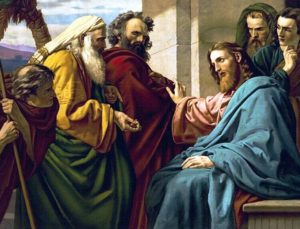Thoughts on Sunday’s Lessons for Nov. 10, 2019
First Reading (Track One): Haggai 1:15b-2:9
Sunday’s readings remind us to place our hope and trust in God, even during hard times.

Christ and the Pharisees, painting by Ernst Karl Georg Zimmermann (1852-1901). (Click image to enlarge.)
In the Track One first reading, we hear the minor prophet Haggai (pronounced “Hah-guy”) date his prophecy specifically in the second year of the reign of King Darius the Great of Persia, some 500 years before Christ. Darius was a successor to King Cyrus, who had released the people from Babylonian exile and sent them back to Jerusalem about 20 years before. The restoration of the city and the Temple proved to be a big job that couldn’t be done quickly. But Haggai calls the people to hang on to their courage and faith in God: Zion’s wealth and grandeur will be rebuilt in splendor even greater than the first Temple.
First Reading (Track Two): Job 19:23-27a
Our Track Two first reading drops us into the middle of Job’s long talk with his friends, in which they try to figure out why so many bad things are happening to him, while he remains unpersuaded by their advice. Job shouts in frustration, wishing that his words could be written in a book or even engraved on a rock forever. In words that Handel would set to memorable music in The Messiah, Job declares, “I know that my Redeemer lives, and that at the last he will stand upon the earth.” Whatever happens to him, in the end, Job expects justice and equity when he stands before God, who will redeem him.
Psalm (Track One): Psalm 145:1-5, 18-22
The 150 Psalms cover a broad range of hope, lament, petition and praise, a diverse anthology that seems appropriate for all the ways that God’s people approach the divine in worship and song. The last group of the Psalms, though, conclude the book with unalloyed praise. As we hear these Psalms, starting with this portion of Psalm 145, we can almost hear resounding chords and choruses as the people raise their voices in awe at God’s wonder. “Great is the Lord, and greatly to be praised!”
Alternative Psalm (Track One): Psalm 98
Psalm 98, available as an alternative to the Psalm 145 passage above for Sunday’s Track One readings, is a song of praise too, this one focused on our joy with God’s faithfulness to the people and the marvelous things that God has done. Singing to the Lord a new song – a phrase that we also chanted in the All Saints readings – the Psalmist calls on all creation to join the chorus: The sea and all that is in it, the rivers clap and the hills ring out with joy. God will judge the world with righteousness and its people with equity.
Psalm (Track Two): Psalm 17:1-9
Confident that he has done no wrong in the face of accusers, the Psalmist echoes the voice of Job as he calls on God to hear his plea of innocence. His prayer comes from lips that do not lie. Inviting God to weigh his heart and melt him down as an assayer judges gold, he is confident that God will be just. “Keep me as the apple of your eye; hide me under the shadow of your wings,” he prays in the comforting words that we sing in Compline at day’s end.
Second Reading: 2 Thessalonians 2:1-5, 13-17
This second letter to the Greek community in Thessalonika probably came a generation after the first, perhaps around 100 CE, and was surely written in Paul’s name by a later follower. Early Christians had expected that Christ would return very soon. But by this late date, many of them had died, and following generations were clearly hoping for some kind of reassurance, particularly since Christians faced Roman persecution. The author urges them not to be deceived by false teachings of a “lawless one” but to stand firm, remember the Good News, and hold fast to good works and words.
Gospel: Luke 20:27-38
Since our last reading from Luke’s Gospel, we have skipped over several major events, including Jesus’ tumultous arrival in Jerusalem to waving palms. Now we find him debating Torah with a group of Sadducees who try to trip him up: When a man who had seven wives dies and goes to heaven, which of the seven women will be his wife? It may seem that Jesus responds by declaring there is no marriage in heaven, but remember that in this and several other parables in this chapter, Jesus is pushing back against trick questions. Those who die are like angels and children of God, he says. In that context, earthly marriage doesn’t matter.
What are “Track 1” and “Track 2”?
During the long green season after Pentecost, there are two tracks (or strands) each week for Old Testament readings. Within each track, there is a Psalm chosen to accompany the particular lesson.
The Revised Common Lectionary allows us to make use of either of these tracks, but once a track has been selected, it should be followed through to the end of the Pentecost season, rather than jumping back and forth between the two strands.
For more information from LectionaryPage.net, click here.
